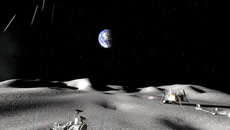Get ready to travel to the first “realistic virtual” universe where you can experience the cosmic evolution in a super-high resolution by zooming forward and backward in time.
In a first, astronomers have created a virtual universe using computer simulation called "Illustris".
"Illustris" can recreate 13 billion years of cosmic evolution in a cube 350 million light-years on a side with unprecedented resolution.
"Until now, no single simulation was able to reproduce the universe on both large and small scales simultaneously,” said lead author Mark Vogelsberger from Massachusetts Institute of Technology and Harvard-Smithsonian Center for Astrophysics (CfA).
Illustris employs a sophisticated computer programme to recreate the evolution of the universe. It includes both normal matter and dark matter using 12 billion 3D “pixels”.
They used 8,000 CPUs running in parallel.
If they had used an average desktop computer, the calculations would have taken more than 2,000 years to complete!
“Illustris is like a time machine. We can go forward and backward in time. We can pause the simulation and zoom into a single galaxy or galaxy cluster to see what's really going on,” says co-author Shy Genel from Harvard-Smithsonian Center for Astrophysics.
The computer simulation began a mere 12 million years after the Big Bang.
When it reached the present day, astronomers counted more than 41,000 galaxies in the cube of simulated space.
Illustris yielded a realistic mix of spiral galaxies like the Milky Way and football-shaped elliptical galaxies.
It also recreated large-scale structures like galaxy clusters and the bubbles and voids of the cosmic web.
On the small scale, it accurately recreated the chemistries of individual galaxies.
Since light travels at a fixed speed, the farther away astronomers look, the farther back in time they can see, said the study that is conduced along with researchers at Heidelberg Institute for Theoretical Studies in Germany.
The results appeared in the journal Nature.





